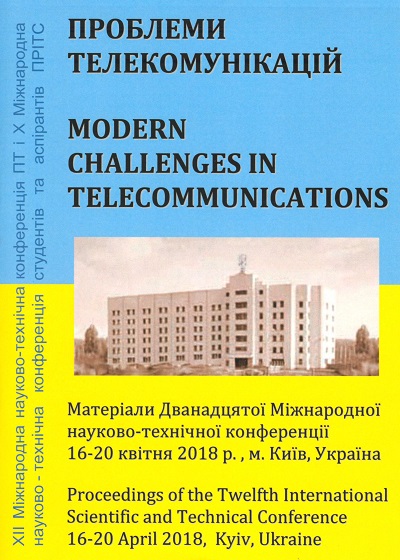СИНХРОНИЗАЦИЯ С ИСПОЛЬЗОВАНИЕМ ВРЕМЕННЫХ МЕТОК ЧАСОВ В БЕСПРОВОДНЫХ СЕНСОРНЫХ СЕТЯХ
Анотація
Timestamp Clock-based Synchronization in Wireless Sensor Networks
Many applications in wireless sensor networks demand synchronizations in a local or global range, but most of existing synchronization protocols consume too much energy of sensor nodes due to periodical synchronization operations. This paper proposes an on demand mechanism, in which a sensor node uses its local clock to generate timestamps for events that it senses, and then the timestamps can be synchronized to a reference time base. By decoupling the synchronization operations from the data communication, the transformation of timestamps can be optimized independently from the delivery of data packets.
Посилання
J. Dong, L. Gu, and C. Zheng, “Research on fault-tolerant strategy of time synchronization for industrial wireless sensor network,” in Proc.ICMTMA Conf, vol. 2, 2011, pp. 1146–1149.
M. L. Sichitiu and C. Veerarittiphan, “Simple, accurate time synchronization for wireless sensor networks,” in Proc. IEEE WCNC 2003, vol. 2, 2003, pp. 1266–1273.
Z. Zhong, P. Chen, and T. He, “On-demand time synchronization with predictable accuracy” / in INFOCOM, 2011 Proceedings IEEE, 2011, pp. 2480–2488.
A. Al-Shaikhi and A. Masoud, “Efficient, single hop time synchronization protocol for randomly-connected wsns,” IEEE Wireless Communications Letters, vol. PP, no. 99, p. 1, 2017.
##submission.downloads##
Як цитувати
Номер
Розділ
Ліцензія
Авторське право (c) 2018 Андрей Васильевич Брицун, Валентина Николаевна Петрова

Ця робота ліцензується відповідно до Creative Commons Attribution 4.0 International License.
Authors who submit to this conference agree to the following terms:a) Authors retain copyright over their work, while allowing the conference to place this unpublished work under a Creative Commons Attribution License, which allows others to freely access, use, and share the work, with an acknowledgement of the work's authorship and its initial presentation at this conference.
b) Authors are able to waive the terms of the CC license and enter into separate, additional contractual arrangements for the non-exclusive distribution and subsequent publication of this work (e.g., publish a revised version in a journal, post it to an institutional repository or publish it in a book), with an acknowledgement of its initial presentation at this conference.
c) In addition, authors are encouraged to post and share their work online (e.g., in institutional repositories or on their website) at any point before and after the conference.

